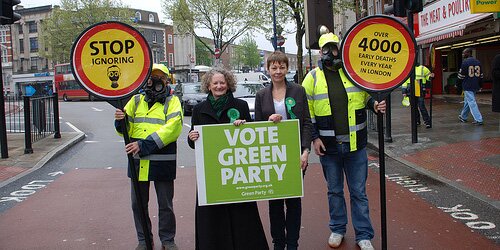The left faces a predicament at election time
10:01 am - May 8th 2009
| Tweet | Share on Tumblr |
A guest post by Joshua Mostafa
 Sunny Hundal’s analysis of the Guardian’s predicament (whom to support since Labour’s transmogrification into the worst of both worlds: sold out and voted out) suggests a bigger question. Leaving aside the editorial decision to give the Tories an easy ride, the hard choices that the Guardian faces are shared by all of us on the left.
Sunny Hundal’s analysis of the Guardian’s predicament (whom to support since Labour’s transmogrification into the worst of both worlds: sold out and voted out) suggests a bigger question. Leaving aside the editorial decision to give the Tories an easy ride, the hard choices that the Guardian faces are shared by all of us on the left.
The fact remains that Labour, for all the depredations of the New Labour clique, remains the only political party that is linked to the labour movement.
The Labour Party rank-and-file, including the majority of its MPs, have never been entirely sold on the third-way ideology (for all its pretensions to being post-ideological, Blairism was clearly an ideology with its own vision and shibboleths; Brown has muddied the waters for tactical reasons, but he cannot abandon the agenda-he is, after all, one of its principle architects).
Likewise, at the height of the Tory re-branding exercise under Cameron, backbench Tories were willing to keep shtum, or at least not to carp too loudly for the most part, about the perceived retreat from their traditional values. The fact that the Tories have walked back from the middle indicates not only confidence in their upper hand, but that they always believed in their own prescriptions.
They preach “conservative means applied to progressive ends”, which is not an inversion of the New Labour doctrine; it is much the same, the difference being that the centre of gravity of the party is way to the right, which means that the professed ends will prove to be transparent sham.
Not that the collective conscience of the Labour backbench proved much of a counter-weight to New Labour, as proven most painfully in the case of the war on Iraq, honourable exceptions such as Robin Cook and the few rebels aside.
This puts the left – not just the Guardian – in a predicament. The Lib Dems have a better set of policies than Labour on many fronts, but they have chosen their ground, and on economic policy, it is not on the left. The centre ground has for some time been like a game of Twister, with the parties picking issues of differentiation on a case-by-case basis.
On a strictly deontological basis, none of them deserve our vote. But this is the real world, and we have to make decisions based on the best outcome possible. The criteria are complex, however. Certainly, on the big civil liberties issues of the day, and their fairly consistent opposition to New Labour’s Washington-beholden foreign policy the Lib Dems have proven themselves the only choice.
Donning Polly Toynbee’s clothes peg one more time, sticking with Labour, and attempting to reshape it from the inside, in the hope that a spell in the cold will allow it to recover its lost bearings, risks abandoning the public to an indefinite period of Tory rule.
But does support for the Lib Dems at Labour’s expense risk opening the path to a bigger Tory majority anyway, as John Rentoul suggests in the Independent? In any case, how would the dream ticket (or the least nightmarish) of a Lib / Lab pact play out? One would hope that the authoritarian instincts of New Labour would be reined in by coalition with the Lib Dems, and that a weakened Labour would also be more vulnerable to revolt from the left, forcing it to put some clear red water between them and the Tories.
This is a highly optimistic scenario, of course. But the state of play in politics today demands that we weigh the probabilities in order to make the most informed choices possible. There is no good option.
—–
Joshua blogs at joshua.almirun.com/
| Tweet | Share on Tumblr |  |
Sorry, the comment form is closed at this time.
Reader comments
The Lib Dems have a better set of policies than Labour on many fronts, but they have chosen their ground, and on economic policy, it is not on the left.
CITE YOUR SOURCE OR BASIS FOR YOUR OPINION.
(please)
I don’t understand (although I’m ready to hear the arguments) the received opinion that the LibDems are to the right on economic policy. They seem to me to be arguing the case for progressive taxation, for a start.
There are some fairly baseless assumptions in this piece – you really think the Lib Dem redistributive tax policy is to the right of “Hammer of the Poor” Purnell? Also a Lib/Lab pact might be a dream for Labourites, but it would be a frelling nightmare for the Lib Dems…
Raising the tax-free personal allowance to £10,000 isn’t on the left? And a party that axes the 10p band is… where, exactly?
Darn, did the earth’s magnetism just reverse again?
And suggesting that £12.5bn be spent on investment in public infrastructure and green industry rather than on a tax cut which will benefit only those who have money left over to spend after they’ve paid for food, rent/mortgage and fuel? Is that not on the left either?
What about spending a whole year’s parliametary questions and a private members’ bill campaigning on fuel poverty for the tariff structure to be changed so that people who use the least power don’t pay the most for it? Is that not on the left?
And, Exhibit A, the one I don’t even necessarily agree with:
TEMPORARY NATIONALISATION OF THE BANKS.
That’s the last word in right wing economic thought, is it?
See Alix- this I define myself as being on the left, & think you are likewise, but New Labour are not any such thing like.
Liberal Democrats & all those of an even vaguely liberal persuasion were lied to before 1997 & have tired of the relentless shite being perpetrated by Blair & Brown- accordingly reject a coalition.
As for unions- they’d better ask themselves, & their members, what the fuck the point of this alliance with Brown actually is. The answer may be a bit disconcerting.
Quite. And if certain other sections of the left, as embodied in this piece, can ignore the facts of the two parties’ records to this extent then the Left as a whole is totally fucked.
That is the left’s predicament indeed, Alix, whether to accept that the Lib Dems are clearly more Left Wing than their previous party of choice or to keep on spouting inconsistent non-facts.
Perhaps Joshua could make a start by explaining which of the LibDem’s economic recovery plan policies is to the right of Labour’s?
http://www.libdems.org.uk/home/liberal-democrat-economic-recovery-plan-12693499
You can wish for a hung parliament and a LibDem/New Labour pact all you like, but it still depends on a freak result. The truth is that under a constituency system and FPTP you only get to vote for the candidates in your area. In most instances it’ll be some right-wing authoritarian …or their worse Tory oppo (arf). New Labour’s vote would have to collapse to a level that makes 1983 look like a landslide victory for the LibDems to get a taste of real power/influence. New Labour always relied on the idea that its supporters had nowhere else to go – except that they do, even if it means not voting -and that the Tory bogeyman would always scare them back into line. For some (even on this blog), that is enough reason to don the biohazard suit and make like Toynbee (yet again). But for others, that game (the same old predicament that is intrinsic to the British political system at election time) is all played out. If you believe in a vote as a positive act for something, there are no good choices left, unless you live a three-way marginal or want to claim that your vote is in reality for an MP whom you’re happy to endorse as an individual.
We might as well have a discussion about Lib Dem tax policy, though it is quite hard to keep up with – it wasn’t long ago that they were on about cutting income tax to 16%, now apparently they don’t want to do that any more and instead they want to raise tax thresholds, so by the time of the election, who knows?
Not sure what is so good about giving a bigger tax cut to someone earning £70,000/year than to someone earning one tenth of that, or why they are so against increasing the assets available to the less well off through Child Trust Funds. The amount of tax that they estimate it is possible to raise from the wealthy looks quite optimistic as well.
There’s plenty of evidence that the VAT cut is having a beneficial economic impact, and in any case, it is temporary, whereas their proposed alternative spending on green jobs presumably isn’t (or is the idea to hire all these people and then sack them again a year later?)
I think the Lib Dems are quite transparently not on the left. By which I don’t mean “to the left of Labour”, which they are on certain issues, sure. I mean actually coming from a Left perspective. Let’s be frank though – “to the left of Labour” doesn’t mean all that much, does it? I don’t believe the spectrum of policy offerings from the three main parties include anything genuinely from the left side of the spectrum.
To be clear, I am not offering New Labour apologia. I tore up my membership card after they excised Clause 4. However, I don’t think the Lib Dems are good – just not as bad as New Labour.
no offence, Joshua, but it might be better to do a little research on what Lib Dem policy is before you start placing them on the left-right continuum. as previous commenters have made plain, the Lib Dems are pretty left-wing. or, if you don’t think that’s the case, provide some examples of Lib Dem policies that most certainly aren’t. i’d love to know, as a party member myself.
“I think the Lib Dems are quite transparently not on the left. ”
Well no, they manage to vary their political alignment depending on area, that’s to be expected where their main premise is liberalism versus authoritarianism. That doesn’t mean that they don’t manage to achieve a lot of what the left want to do, in practice, with their policy direction.
“Not sure what is so good about giving a bigger tax cut to someone earning £70,000/year than to someone earning one tenth of that”
If you assume the basic cost of living is around the £7k mark then a rise of the threshold to £10k for someone earning £13k ends up with 10% more of their disposable income than they had before. Someone on £50k will take home an extra 2%. It’s a redistributive method…you know, the opposite of what Labour did when they made a blanket 20p tax rate and plunged the poor in to greater tax while giving the rich less to pay?
“There’s plenty of evidence that the VAT cut is having a beneficial economic impact,”
Where? There is evidence that the economy picked up compared to previous months in the YEAR which can also be attributed to the decline in interest rates as much as anything else.
“whereas their proposed alternative spending on green jobs presumably isn’t ”
yeah, very stupid trying to get people in to jobs permanently rather than give people, mostly those that can afford to spend, a few extra quid!
don @ 13:
Not sure what is so good about giving a bigger tax cut to someone earning £70,000/year than to someone earning one tenth of that
The £70,000 figure is a red herring here. The person on £70k gets the same cut that a person on £10k gets, as is the nature of personal allowance changes. People earning less than £10k would not get as much of a cut in their income taxe, simply because they’re not paying much as it is. Your hypothetical person earning £7k would have their entire income tax bill scrapped, leaving it impossible to give them any larger cut in income tax.
And of course the person earning £70k would probably end up contributing more back based on the reduction in assorted deductions, chiefly the higher rate pension relief. There’s also local income tax to factor in here, as a replacement for council tax.
You’re right that on one very narrow and skewed calculation, you could say ‘aha, the £70k person is gaining more!’, if you completely ignore every other aspect of the tax policy. But ignorance isn’t exactly a good basis for making political judgements.
, or why they are so against increasing the assets available to the less well off through Child Trust Funds
The CTF is hardly an impressive scheme. Tax cuts that benefit low-earning parents and extra funding for children from poorer backgrounds (the ‘pupil premium’) would do more to raise the long-run prospects of those children than giving them a very modest lump sum at 18 and wishing them good luck with it.
This is a precis of what was on the LibDem site a few months ago – apologies if it’s been updated since then, I’m lazy…
‘[We propose] cutting the basic rate of income tax to just 16p… and scrapping the unfair council tax, which hurts the poorest the most… the poorest pensioners pay four times as high a percentage of their income than the richest working people. Removing this unfair tax and replacing it with a fair local income tax will massively shift the tax burden away from the poor – and take many people on the lowest incomes out of tax altogether…
And we will make up the money by taxing pollution and reforming capital gains tax and pensions tax relief… We believe everyone should be entitled to basic rate relief on their pension contributions – but higher earners shouldn’t get extra money by getting higher rate tax relief…
We will index-link capital gains and then tax them as income. No more will hedge fund managers be able to present their income as capital to secure themselves an 18% tax rate, while their cleaners pay 31%.
We must stop the drive from companies who decide to locate “virtually” offshore. A Liberal Democrat Government would have a very simple rule. If your company is based in the UK, you pay tax in the UK – not Jersey or the Cayman Islands.’
Looks pretty left-wing to me (and a little bit Green to boot, which is a good thing to my mind).
18 – Rowan, however admirable that might be, it isn’t Lib Dem policy any more.
16/17 – the Lib Dem critique of tax credits is that it is an outrage that any family earning £50k or more gets any. Yet their tax policy contradicts this analysis, by giving £700 to every higher rate taxpayer, which is more than it gives to anyone earning less than £10,000/year. It would be cheaper and more progressive to restrict the tax cut to, say, anyone earning up to twice the average wage. The money saved could be used to, say, increase benefits for unemployed people (who get not a penny from these tax cuts).
as for the green jobs, these aren’t permanent jobs because the money to pay for them is from the VAT cut, which is temporary. So at the moment the policy is to create loads of jobs and then withdraw the funding (or find another £12.5 billion/year from somewhere else).
And on Child Trust Fund, its aim is to reduce wealth inequality, which the pupil premium does nothing to address.
“Yet their tax policy contradicts this analysis, by giving £700 to every higher rate taxpayer,”
The £700 figure is based on the increase in personal allowance, hence why it is the only type of tax cut that benefits the poorer more. No, it won’t affect those already under the personal allowance threshold but that’s a whole different kettle of fish that usually involved other benefits so it’s more than slightly facetious to bring that up.
Not that I disagree with you as such, I believe that the level of tax allowance you get should be variable to ensure that everyone has the same percentage of “take home” pay, however that system wouldn’t be transparent and it certainly wouldn’t be simple. Neither would any prospect of keeping “high earners” on the £6.5k allowance.
“as for the green jobs, these aren’t permanent jobs because the money to pay for them is from the VAT cut, which is temporary. So at the moment the policy is to create loads of jobs and then withdraw the funding (or find another £12.5 billion/year from somewhere else).”
The policy is based on the borrowing of £12.5 billion. How much of that needs to be spent to create the additional jobs needed to get certain green projects finished? I think you’re putting a little too much stock in the idea that the full £12.5 billion would be pumped in to as many jobs for a year, rather than on projects that themselves would create jobs.
“18 – Rowan, however admirable that might be, it isn’t Lib Dem policy any more.”
Alas, it is a shame that parties have to move their policy when the government insists on changing its own isn’t it? What was it, no income tax rises, then tax hikes? Plenty of them in fact though they’ll spin their way out of just how much. Referendum? Perhaps that one should be left in the bag here. PR elections? Bottled that one too. It’s rather rich for you to be somewhat defending a party that has monumentally changed and/or failed its original policy direction by taking pot shots at a party listening to its membership and adapting to that changing beast.
Gosh, it’s HARD to find out what LibDem tax policy currently is… or maybe I’m having a comprehension failure on their website. I can’t see anthing that says any of the above policies have been rescinded; I can see the addition of scrapping the VAT cut and increasing the personal allowance.
If anyone can find a comprehensive account of what it is I’ll be voting for next month, I’d be grateful…
@Joshua Mostafa: If Clause 4 was a dealbreaker for you, then no, the Lib Dems aren’t a natural home for you. But unless you’re holding out for it to be reintroduced to the Labour party, then you might as well vote for the electoral reform that will allow you to vote for something you support.
I might, however, ask that you refrain from using Left and Socialist interchangeably. No, the Lib Dems aren’t socialist. I for one don’t think that leaves them no right to call themselves left wing.
ps. to those complaining that the Lib Dem policy has changed, note that the shift has been in a more redistributive direction. It’s been calibrated so it will cost about the same as the 16p rate in revenue, I suspect, but this way, as Rob explains at 18, those on lower incomes get a greater percentage of their income back.
Rowan: That’s the problem with a democratic policy-making framework, I’m afraid. Lib Dem policy get made like this:
1. FPC (Federal Policy Committee) puts together a policy.
2. It is probably trailed in the press as “a policy shift”.
3. The policy must be approved by a majority at federal conference before it is official party policy.
You will therefore find that although the shift to a personal allowance raise has been publicised, it will not be found on the policy section of the site until conference has approved it. For now, the policies you are seeing remain current, but I don’t see any great discontent about the new package, so it will almost certainly be approved when it is presented. I don’t know if it will be presented at Bournemouth in September, or whether the party will wait until Spring so as to allow themselves as much flexibility as possible before the next election, but… you get the idea.
20 – “Neither would any prospect of keeping “high earners” on the £6.5k allowance.”
Don’t have to do that, just lower the threshold at which people start paying the higher rate so that everyone earning over, say, £50,000 ends up paying the same amount of tax as at present. That’s what the government did to compensate the people who lost out from the 10p starting rate abolition.
“I think you’re putting a little too much stock in the idea that the full £12.5 billion would be pumped in to as many jobs for a year, rather than on projects that themselves would create jobs.”
Is there a policy paper explaining how spending £12.5 billion for one year will create ongoing jobs for the long term? If so, fair enough, but that’s not what the soundbite implies.
“It’s rather rich for you to be somewhat defending a party that has monumentally changed and/or failed its original policy direction by taking pot shots at a party listening to its membership and adapting to that changing beast.”
Most Lib Dem members don’t know what their party’s tax policy currently is. So however admirable, the changes can’t really be a result of ‘listening to the membership’.
Thanks Andy, that makes sense. I am relieved that my comprehension skills are relatively intact.
@DonP “Rowan, however admirable that might be, it isn’t Lib Dem policy any more.”
Strangely enough, Don, I don’t recall you talking it up as admirable during the year and a half it was Lib Dem policy – why was that then?
I trust you see it is more progressive to raise the PA than it is to offer a 16% tax cut. A lot of us were very happy with the principle of the basic rate going down, but would have preferred a bit of a boost in the PA as well. I couldn’t believe our luck when they decided to move the whole cut across to the PA. Still, you carry on being bad-tempered because a few million of the poorest people in society get lifted out of tax, why don’t you. That’s always an attitude that covers the Labour movement in glory.
As for the election, let’s see what the manifesto says, shall we? I for one very much hope we stick to the PA card, but we’ll see – they may decide in the end to offer a combined basic rate drop and lesser PA rise (I hope not – and once the PA has been voted through conference I think Clegg will find it very hard to draw us back).
Rowan, the very broad outline is in this news item here:
http://www.libdems.org.uk/home/liberal-democrats-will-cut-people%E2%80%99s-income-tax-bill-by-%C2%A3700-235190068;show
but as Andy says we won’t know the full details until nearer the election.
Basically, I am expecting most of the “where’s the money coming from” bit to remain the same as in the former plan. The difference will be it goes on raising the PA rather than the basic rate tax cut.
PS The LD website appears to have the worst designed search function in the world, so I’m unsurprised at your difficulty.
A policy I’d like to see would be raising the capital threshold for means-tested benefits. At present, for example, people receive a lower rate of income-based jobseekers’ allowance is they have more than £6,000 capital and none at all if they have over £16,000.
Yes, I know it’s hardly at the top of Purnell’s list and most people wouldn’t like it, but I’d like to see those thresholds rise every year, which currently they don’t.
Thanks, Alix.
Hi Alix,
26 – “Still, you carry on being bad-tempered because a few million of the poorest people in society get lifted out of tax, why don’t you. That’s always an attitude that covers the Labour movement in glory.”
I’m not bad tempered at all. I’m questioning and suggesting improvements to your party’s policies.
Agree that raising thresholds is better than the proposed 4p tax cut. For the next version of Lib Dem tax policy, what I think would be even better is to scale back the amounts going to higher earners and put that into extra financial support for the low earners who get little or not benefit from this tax cut (it is a bit harsh, after all, that someone earning £60,000 gets more out of this policy than someone on jobseekers’ allowance).
Obviously less good for the purpose of putting in your Focus leaflets in the southern marginals where the Tories hammered your party over Local Income Tax last time, but would you agree that these changes would be more progressive?
Andy Hinton, I take your point about the difference between the left broadly, and socialism in specific. That’s a good and very valid distinction to make, perhaps one that in my original post I had not taken into account – as a socialist it’s easy to conflate the two.
However, I would argue that socialism is by no means antithetical to liberty. I think it’s worth restating this, given that the policies of New Labour – in fact, equally contemptuous of socialism and liberty – risk creating a false dichotomy, as exploited by Nick Clegg in a speech he gave early on as leader (the URL I had, from the Lib Dems’ site, is now dead, or I would post it) -
“Socialism believes that Government knows best. Liberalism believes people know best.”
The first of these sentences is an generalisation that ignores the currents in socialism that are have a hearty suspicion of the state as a paternalist, top-down distributor of social good, and instead encourage the development of independent workers’ cooperatives, keeping decision-making at a level as close to the people as is possible. Clegg should know better: statements such as these encourage the closing of minds to ideological alternatives; and it is this closing of minds (along with the voting system, but one could argue that these reinforce each other) that has kept the UK locked into its two-party system since 1945.
@DonP, sounds good to me. Although to be honest what I’d rather do is junk this whole system, don’t tax income at all and put all taxes on capital.
Reactions: Twitter, blogs
-
Liberal Conspiracy
New post: The left faces a predicament at election time http://bit.ly/ZcCUo
-
Liberal Conspiracy
New post: The left faces a predicament at election time http://bit.ly/ZcCUo
[Original tweet] -
josh >> /dev/blog & » Blog Archive » Where left?
[...] wrote a post on LiberalConspiracy.org about the poor choices on offer for left-inclined voters in the UK. [...]
-
micapam
My post on the lack of choice for the #left: http://bit.ly/ZcCUo
[Original tweet]
Sorry, the comment form is closed at this time.
NEWS ARTICLES ARCHIVE





















